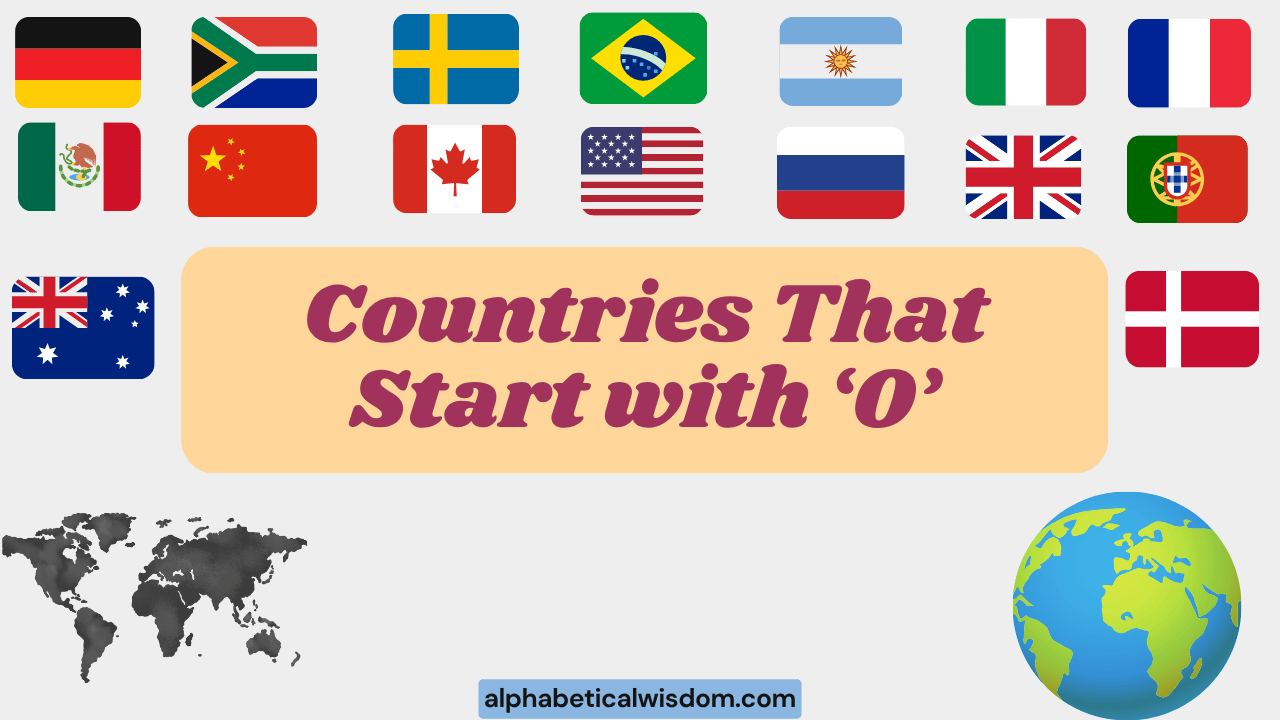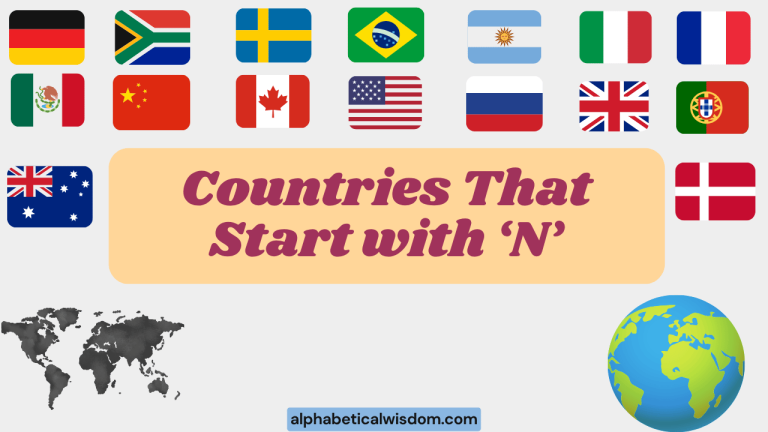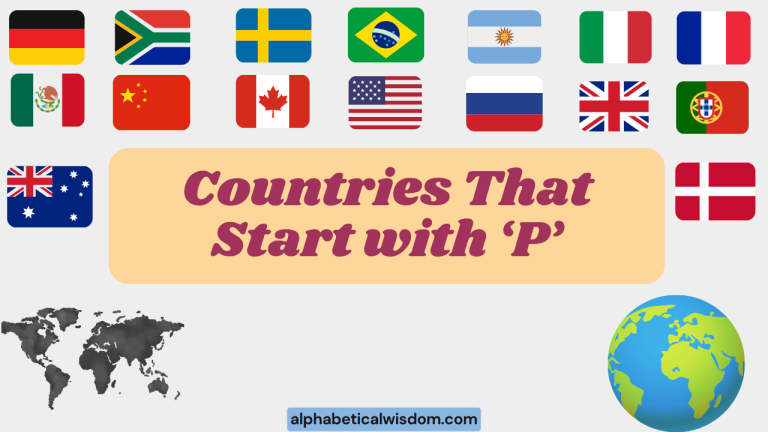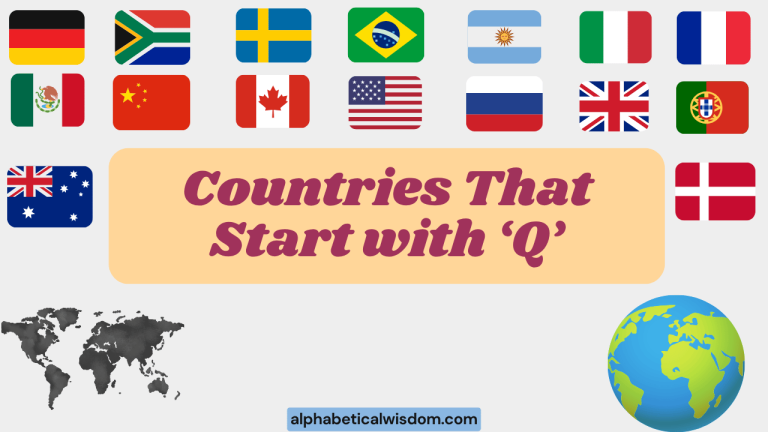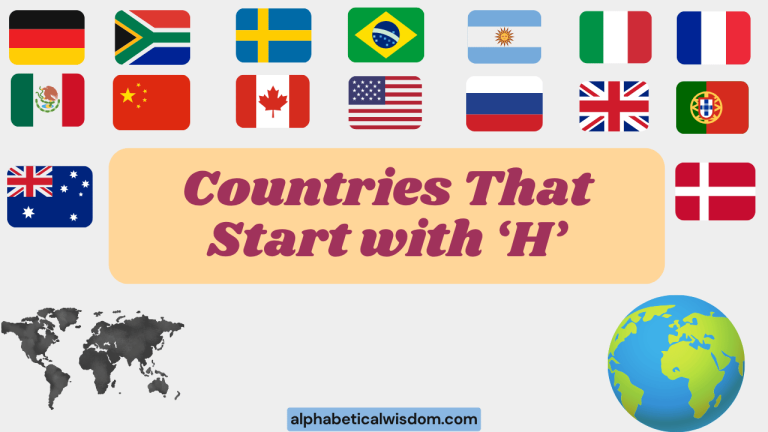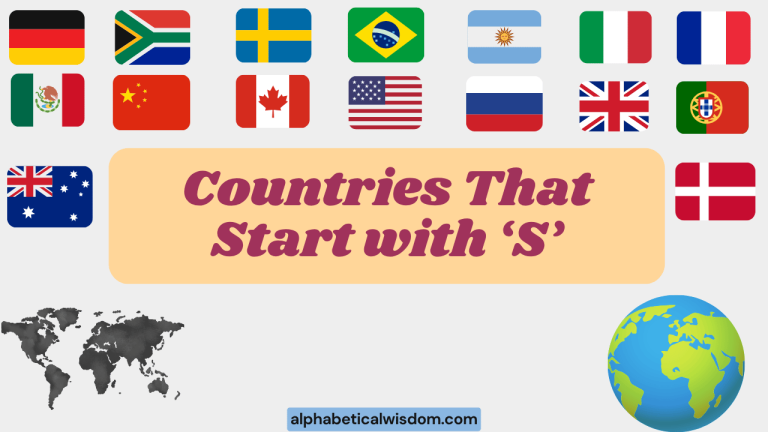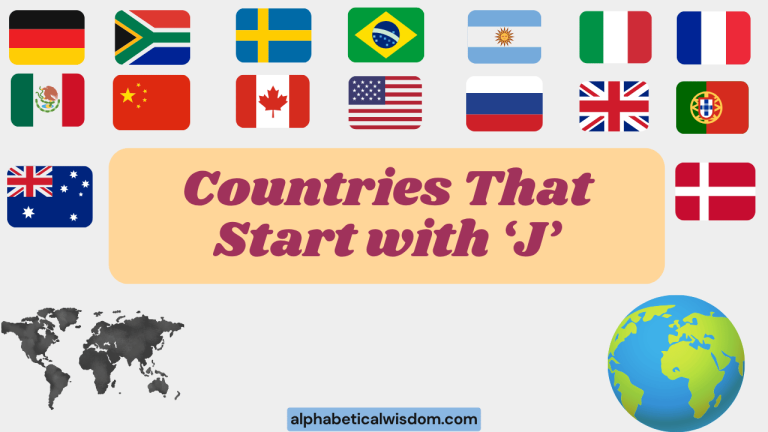Countries Starting with O: Grammar, Usage, and Examples
Understanding how to use country names correctly is crucial for clear and effective communication in English. This article focuses on countries whose names begin with the letter “O,” exploring their grammatical properties, proper usage, and common pitfalls.
Whether you’re an English language learner, a student preparing for exams, or simply someone who wants to improve their writing skills, this guide provides a comprehensive overview with numerous examples and practical exercises.
Table of Contents
- Introduction
- Definition: Countries Starting with ‘O’
- Structural Breakdown
- Types and Categories of Country Names
- Examples of Countries Starting with ‘O’
- Usage Rules
- Common Mistakes
- Practice Exercises
- Advanced Topics
- FAQ
- Conclusion
Introduction
Mastering the grammar associated with country names is essential for precise and effective communication in English. This article delves into the specifics of countries whose names begin with the letter “O,” providing a comprehensive guide to their grammatical properties, correct usage, and common errors to avoid.
The correct usage of country names enhances clarity in writing and speaking, facilitating smoother and more professional interactions. This guide is designed for English language learners, students, and anyone seeking to refine their language skills, offering a wealth of examples and practical exercises to reinforce learning.
Country names, like other proper nouns, follow specific grammatical rules that govern their use in sentences. Understanding these rules is crucial for writing clear and grammatically correct English.
Specifically, this article will focus on the nuances of using country names that begin with the letter “O,” offering a detailed exploration of their grammatical behavior. This includes examining their role as subjects, objects, and modifiers, and understanding how they interact with articles and prepositions.
By mastering these details, you can significantly improve the accuracy and sophistication of your English communication.
Definition: Countries Starting with ‘O’
A country name is a proper noun that identifies a specific political entity with defined borders and a recognized government. When we refer to “countries starting with ‘O’,” we are focusing on those sovereign states whose official English name begins with this letter.
These names function grammatically as nouns and are typically capitalized. Understanding the correct usage of these names is vital for accurate communication.
Classification
Country names are classified as proper nouns. Proper nouns are specific names of people, places, or things and are always capitalized in English. This capitalization distinguishes them from common nouns, which refer to general categories. For instance, “country” is a common noun, while “Oman” is a proper noun.
Function
Country names can function in various roles within a sentence. They can act as the subject, performing the action of the verb; the object, receiving the action of the verb; or as modifiers, providing additional information about other nouns. Their grammatical function determines how they interact with other words in the sentence. For example, in the sentence “Oman is a beautiful country,” “Oman” is the subject.
Contexts
The context in which a country name is used can affect the surrounding grammar. For example, when discussing travel, you might say, “I plan to visit Oman next year.” In a political context, you might say, “Oman plays a significant role in regional diplomacy.” The choice of prepositions and articles can change depending on the specific context.
Structural Breakdown
The structure of sentences involving country names starting with “O” often follows typical English sentence patterns. However, there are nuances regarding articles and prepositions that need to be considered.
Subject-Verb Agreement
When a country name acts as the subject of a sentence, the verb must agree in number with the subject. Since country names are singular, they generally take singular verbs. For example, “Oman is a country in the Middle East.”
Articles
Most country names do not require the definite article “the.” However, there are exceptions, particularly when the country name includes words like “republic,” “kingdom,” or “states,” or when referring to a collection of islands. For countries starting with “O,” this is not typically relevant, but it’s a good general rule to remember.
Prepositions
The choice of preposition depends on the context. Common prepositions used with country names include in, to, from, and of. For example, “I live in Oman,” “I am traveling to Oman,” “I am from Oman,” and “The culture of Oman is fascinating.”
Types and Categories of Country Names
While the focus is on countries starting with “O,” it’s helpful to understand broader categories of country names to better understand their grammatical behavior.
Single-Word Names
Most country names consist of a single word, such as Oman. These names are straightforward to use and generally do not require articles.
Multi-Word Names
Some country names consist of multiple words, such as “The United States of America.” These names often require the definite article “the.” However, there are no countries starting with “O” that fall into this category.
Former Names
It’s important to be aware of former names of countries, as historical contexts may require their use. However, this is not directly relevant to countries currently starting with “O.”
Examples of Countries Starting with ‘O’
The primary country that starts with the letter “O” is Oman. Understanding how to use “Oman” in various grammatical contexts is crucial.
Examples as Subject
In these examples, “Oman” functions as the subject of the sentence, performing the action described by the verb.
The following table provides examples of sentences where “Oman” acts as the subject:
| Sentence | Explanation |
|---|---|
| Oman is a country in the Middle East. | “Oman” is the subject, and “is” is the verb. |
| Oman has a rich cultural heritage. | “Oman” is the subject, and “has” is the verb. |
| Oman borders Saudi Arabia and Yemen. | “Oman” is the subject, and “borders” is the verb. |
| Oman exports oil and gas. | “Oman” is the subject, and “exports” is the verb. |
| Oman attracts many tourists each year. | “Oman” is the subject, and “attracts” is the verb. |
| Oman is known for its frankincense. | “Oman” is the subject, and “is known” is the verb. |
| Oman offers stunning landscapes. | “Oman” is the subject, and “offers” is the verb. |
| Oman values its traditions. | “Oman” is the subject, and “values” is the verb. |
| Oman participates in international forums. | “Oman” is the subject, and “participates” is the verb. |
| Oman has a stable political environment. | “Oman” is the subject, and “has” is the verb. |
| Oman invests heavily in infrastructure. | “Oman” is the subject, and “invests” is the verb. |
| Oman promotes sustainable development. | “Oman” is the subject, and “promotes” is the verb. |
| Oman celebrates its National Day on November 18th. | “Oman” is the subject, and “celebrates” is the verb. |
| Oman maintains strong diplomatic ties. | “Oman” is the subject, and “maintains” is the verb. |
| Oman faces challenges related to water scarcity. | “Oman” is the subject, and “faces” is the verb. |
| Oman is working to diversify its economy. | “Oman” is the subject, and “is working” is the verb. |
| Oman encourages foreign investment. | “Oman” is the subject, and “encourages” is the verb. |
| Oman is a member of the Gulf Cooperation Council. | “Oman” is the subject, and “is” is the verb. |
| Oman has a coastline along the Arabian Sea. | “Oman” is the subject, and “has” is the verb. |
| Oman preserves its historical sites. | “Oman” is the subject, and “preserves” is the verb. |
| Oman relies on its natural resources. | “Oman” is the subject, and “relies” is the verb. |
| Oman values education and innovation. | “Oman” is the subject, and “values” is the verb. |
| Oman’s population is diverse. | “Oman’s population” is the subject, and “is” is the verb. |
| Oman attracts researchers with its unique geography. | “Oman” is the subject, and “attracts” is the verb. |
| Oman’s climate is generally hot and arid. | “Oman’s climate” is the subject, and “is” is the verb. |
Examples as Object
In these examples, “Oman” functions as the object of the verb, receiving the action.
The following table provides examples of sentences where “Oman” acts as the object:
| Sentence | Explanation |
|---|---|
| I want to visit Oman someday. | “Oman” is the object of the verb “visit.” |
| They explored Oman during their vacation. | “Oman” is the object of the verb “explored.” |
| She studied the history of Oman. | “Oman” is the object of the preposition “of.” |
| He admires the culture of Oman. | “Oman” is the object of the preposition “of.” |
| We discussed the economic situation in Oman. | “Oman” is the object of the preposition “in.” |
| The explorer discovered ancient ruins in Oman. | “Oman” is the object of the preposition “in.” |
| The company invested in Oman’s infrastructure. | “Oman’s infrastructure” is the object of the preposition “in.” |
| Many people appreciate the beauty of Oman. | “Oman” is the object of the preposition “of.” |
| The journalist reported on the developments in Oman. | “Oman” is the object of the preposition “in.” |
| The traveler photographed the landscapes of Oman. | “Oman” is the object of the preposition “of.” |
| I have always been fascinated by Oman. | “Oman” is the object of the preposition “by.” |
| The diplomat negotiated agreements with Oman. | “Oman” is the object of the preposition “with.” |
| The scholar researched the traditions of Oman. | “Oman” is the object of the preposition “of.” |
| The artist painted scenes from Oman. | “Oman” is the object of the preposition “from.” |
| The chef learned to cook dishes from Oman. | “Oman” is the object of the preposition “from.” |
| The writer wrote a book about Oman. | “Oman” is the object of the preposition “about.” |
| The student presented a project on Oman. | “Oman” is the object of the preposition “on.” |
| The tourist bought souvenirs from Oman. | “Oman” is the object of the preposition “from.” |
| The historian analyzed the past of Oman. | “Oman” is the object of the preposition “of.” |
| The investor considered opportunities in Oman. | “Oman” is the object of the preposition “in.” |
| The organization provided aid to Oman. | “Oman” is the object of the preposition “to.” |
| The scientist studied the geology of Oman. | “Oman” is the object of the preposition “of.” |
| The team trained athletes from Oman. | “Oman” is the object of the preposition “from.” |
| The conference hosted delegates from Oman. | “Oman” is the object of the preposition “from.” |
| The museum displayed artifacts from Oman. | “Oman” is the object of the preposition “from.” |
Examples as Modifier
In these examples, “Oman” acts as a modifier, providing additional information about another noun.
The following table provides examples of sentences where “Oman” acts as a modifier:
| Sentence | Explanation |
|---|---|
| The Oman government is investing in renewable energy. | “Oman” modifies “government.” |
| Oman’s economy relies heavily on oil exports. | “Oman’s” modifies “economy.” |
| The Oman culture is rich in traditions. | “Oman” modifies “culture.” |
| Oman’s climate is generally hot and arid. | “Oman’s” modifies “climate.” |
| The Oman people are known for their hospitality. | “Oman” modifies “people.” |
| Oman’s landscape is diverse and beautiful. | “Oman’s” modifies “landscape.” |
| The Oman currency is the Omani Rial. | “Oman” modifies “currency.” |
| Oman’s history dates back thousands of years. | “Oman’s” modifies “history.” |
| The Oman embassy is located in Washington, D.C. | “Oman” modifies “embassy.” |
| Oman’s tourism industry is growing rapidly. | “Oman’s” modifies “tourism industry.” |
| The Oman flag features three horizontal stripes. | “Oman” modifies “flag.” |
| Oman’s national animal is the Arabian oryx. | “Oman’s” modifies “national animal.” |
| The Oman desert offers stunning views. | “Oman” modifies “desert.” |
| Oman’s coastline stretches for over 3,000 kilometers. | “Oman’s” modifies “coastline.” |
| The Oman mountains are home to unique flora and fauna. | “Oman” modifies “mountains.” |
| Oman’s education system is constantly improving. | “Oman’s” modifies “education system.” |
| The Oman government is promoting technological innovation. | “Oman” modifies “government.” |
| Oman’s healthcare system is accessible to all citizens. | “Oman’s” modifies “healthcare system.” |
| The Oman economy is diversifying beyond oil and gas. | “Oman” modifies “economy.” |
| Oman’s infrastructure projects are attracting foreign investment. | “Oman’s” modifies “infrastructure projects.” |
| The Oman culture emphasizes respect for elders. | “Oman” modifies “culture.” |
| Oman’s legal system is based on Islamic law. | “Oman’s” modifies “legal system.” |
| The Oman military is well-trained and equipped. | “Oman” modifies “military.” |
| Oman’s foreign policy promotes peace and stability. | “Oman’s” modifies “foreign policy.” |
| The Oman art scene is thriving. | “Oman” modifies “art scene.” |
Usage Rules
Using country names correctly involves adhering to specific grammatical rules. These rules ensure clarity and accuracy in communication.
Capitalization
Always capitalize the first letter of a country name. This is because country names are proper nouns.
For example, write “Oman,” not “oman.”
Articles
Generally, do not use the definite article “the” before the name of a country unless the name includes words like “republic,” “kingdom,” or “states,” or refers to a group of islands. Since “Oman” is a single-word name, the article is not used.
Prepositions
Use the correct preposition depending on the context. Common prepositions include in, to, from, and of. The choice of preposition depends on the relationship between the country and the rest of the sentence.
Common Mistakes
Even experienced English speakers sometimes make mistakes when using country names. Here are some common errors to avoid.
Incorrect Capitalization
Incorrect: i want to visit oman.
Correct: I want to visit Oman.
Incorrect Article Usage
Incorrect: I am going to the Oman.
Correct: I am going to Oman.
Incorrect Preposition Usage
Incorrect: I am from at Oman.
Correct: I am from Oman.
Practice Exercises
Test your understanding of country name usage with these exercises.
Exercise 1: Fill in the Blanks
Fill in the blanks with the correct preposition or article (if needed).
The following table provides fill-in-the-blank sentences, along with their answers:
| Question | Answer |
|---|---|
| I am traveling ____ Oman next week. | to |
| She is ____ Oman. | from |
| The capital ____ Oman is Muscat. | of |
| He lives ____ Oman. | in |
| The culture ____ Oman is fascinating. | of |
| They are studying ____ Oman. | about |
| The goods are imported _____ Oman. | from |
| He sent a letter _____ Oman. | to |
| She learned a lot _____ Oman. | in/about |
| I dream _____ visiting Oman someday. | of |
Exercise 2: Correct the Sentences
Correct the following sentences that contain errors in country name usage.
The following table provides incorrect sentences to correct, along with their correct versions:
| Incorrect Sentence | Correct Sentence |
|---|---|
| The Oman is a beautiful country. | Oman is a beautiful country. |
| I am from at Oman. | I am from Oman. |
| She wants to go the Oman. | She wants to go to Oman. |
| Oman have a rich history. | Oman has a rich history. |
| The capital of oman is Muscat. | The capital of Oman is Muscat. |
| I’m interesting in oman culture. | I’m interested in Oman’s culture. |
| Visit at Oman is a great experience. | Visiting Oman is a great experience. |
| Oman are located in the Middle East. | Oman is located in the Middle East. |
| The weather in oman it’s hot. | The weather in Oman is hot. |
| I never been to oman before. | I have never been to Oman before. |
Exercise 3: Sentence Construction
Create sentences using “Oman” in the following roles: subject, object, and modifier.
Here are example sentences, demonstrating the various grammatical roles of “Oman”:
| Role | Example Sentence |
|---|---|
| Subject | Oman is known for its beautiful landscapes. |
| Object | I plan to visit Oman next year. |
| Modifier | The Oman government is investing in sustainable energy. |
| Subject | Oman’s economy is growing steadily. |
| Object | She learned a lot about Oman’s history. |
| Modifier | The Oman culture is rich and diverse. |
| Subject | Oman has a strategic location in the Middle East. |
| Object | He wrote a report on Oman’s tourism industry. |
| Modifier | The Oman desert is a popular tourist destination. |
| Subject | Oman exports dates and frankincense. |
Advanced Topics
For advanced learners, understanding the nuances of using country names in complex sentence structures and idiomatic expressions is essential.
Complex Sentences
Using country names in complex sentences requires careful attention to clause structure and verb agreement. For example: “Although Oman is a desert country, it has surprisingly diverse ecosystems.”
Idiomatic Expressions
While there are no common idiomatic expressions that specifically use “Oman,” understanding how country names generally fit into idioms is helpful. For example, you might say “He traveled the world, from America to Oman,” using “Oman” as a representative of a distant or exotic location.
Formal vs. Informal Usage
In formal writing, it’s important to use the full and official name of the country when appropriate. In informal contexts, shorter versions are acceptable.
For example, in a formal report, you might write “The Sultanate of Oman,” while in a casual conversation, you would say “Oman.”
FAQ
Here are some frequently asked questions about using country names in English.
- Is it correct to say “the Oman”?
No, it is generally incorrect to use the definite article “the” before “Oman.” The article is typically used only with country names that include words like “republic,” “kingdom,” or “states,” or refer to a group of islands. - What is the correct preposition to use when talking about living in Oman?
The correct preposition is “in.” For example, “I live in Oman.” - Should I capitalize “oman”?
Yes, always capitalize the first letter of “Oman” because it is a proper noun. - How do I use “Oman” as a modifier?
You can use “Oman” as a modifier by placing it before the noun it modifies. For example, “The Oman government is investing in education.” You may also use the possessive form, “Oman’s,” as in “Oman’s economy is growing.” - What is the official name of Oman?
The official name of Oman is the Sultanate of Oman. However, “Oman” is commonly used in most contexts. - Can I use “Oman” in a sentence as an object?
Yes, you can use “Oman” as an object. For example, “I want to visit Oman.” - What is the demonym for Oman?
The demonym for Oman is Omani. For example, “He is an Omani citizen.” - Is Oman a singular or plural noun?
Oman is a singular noun. Therefore, it takes a singular verb. For example, “Oman is a beautiful country,” not “Oman are a beautiful country.” - When should I use “Oman” versus “the Sultanate of Oman”?
Use “the Sultanate of Oman” in formal contexts, such as official documents or academic papers. In most other contexts, “Oman” is perfectly acceptable. - What are some common phrases used with “Oman?”
Common phrases include “in Oman,” “to Oman,” “from Oman,” “the culture of Oman,” and “Oman’s economy.” - How does the grammar change when using “Oman” in a question?
The grammar remains the same. For example, “Is Oman a safe country to visit?”
Conclusion
Mastering the grammar of country names, particularly those starting with “O,” enhances your overall English proficiency. This article has provided a detailed overview of the grammatical properties of “Oman,” including its classification, function, and proper usage in various contexts.
By understanding the rules of capitalization, article usage, and preposition selection, you can avoid common mistakes and communicate more effectively. Remember to practice using “Oman” in different sentence structures to solidify your understanding.
By reviewing the examples and completing the practice exercises, you can reinforce your knowledge and build confidence in your ability to use country names correctly. Continued practice and attention to detail will further refine your skills and enable you to communicate with greater precision and clarity.
Keep practicing, and you’ll find that using country names correctly becomes second nature!
